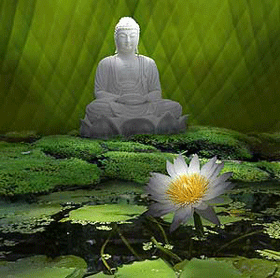London, UK — Might reexamining the importance of Buddhist and other spiritual principles reawaken our appreciation of the balance between man and planet?
 A lot of people think so. After all, there are several overarching principles to spirituality and sustainability that share very similar traits.
A lot of people think so. After all, there are several overarching principles to spirituality and sustainability that share very similar traits.
Satish Kumar, author, ecologist, pacifist and advisor to Our Future Planet, has no doubt that Buddhism can play a vital role in explaining ways we can achieve happiness and look after our world.
“Buddhism essentially says that all things are related,” he explains. “Humans and nature are all connected. The word nature itself can essentially mean to be born. Nature, nativity, post natal, pre natal, all of these words have their root in being born.”
“So the birds in the sky, the deer, the trees and the rivers, they are all our kith and kin. What we do to nature we do to ourselves. This is about the unity of life, and we need to show respect for life, and not damage other life. Harming other beings has to be the ultimate last resort.”
A moment’s thought about how this relates into global sustainability shows that extending this mindset would have immediate benefits.
There’s no way business leaders or governments following such doctrines would consider mining Alaskan oilfields, to the destruction of indigenous wildlife, or forcing indigenous communities out of historical homelands, in search of a quick dollar.
Thinking minds
“We are all sentient beings,” continues Kumar. “And as such we need to respect, and be respected. Cutting, polluting, overfishing, these are not respectful ways of living. We also tend to think in terms of human superiority over the web of life. But this is not our environment, it is the environment.”
“In terms of livelihood, we can look for a simple life to live simply,” he says. “We can minimise our impacts, we can practice restraint. Not everything belongs to us and we can minimise our needs. Two of the curses of modern civilisation include vanity and waste. Without these we can look only to vital needs and reduce our needs.”
“We can increase our imagination, we can look to find delight in different dimensions, in things like music, poetry, art, nature and flowers. Voluntary simplicity and minimalism, minimalising what we need in our life,” he goes on.
Again, such approaches illustrate only too clearly the impacts humanity has on the planet, many of which, spiritualists argue, serve only to deepen human discontent and harm our potential for compassion.
“We need to be less possessive, less concerned about owning, pleasure, love, care, compassion, these are important.” suggests Kumar.
“We can live well and simply. Why have 20 pairs of shirts, when five is sufficient. Why have ten pairs of shoes in the house, more than one computer, more than one television. Why not have one television and come to watch it together as a community or as a family?”
“Buddhism is not about denial, it is about walking the middle path, it is not about all or nothing,” he reveals.
‘If people had pursued the concept of immunity and moderation, we would not be trapped in the current financial crisis, which stems largely from excessive consumption,’ it suggests.
‘If people were sufficiently aware of the interconnection of their actions with the environment, we would have consumed more wisely without leaving such harmful effects on the world around us.’
The idea is that failing to practice moderation has led to an excessive reliance on consumption, demanding more and more for the individual and putting a higher and higher price on our planet to offer up these resources.
A glimpse down Western high streets, where consumers jostle for the latest offering, before photographing their new toys on mobile phones, might illustrate where we have strayed off the path. A little more mindfulness would probably do the world of good.
By Giles Crosse, Ourfutureplanet.org




